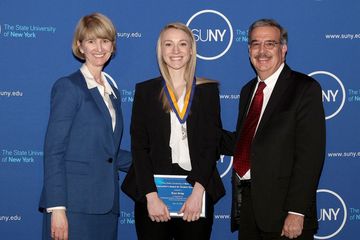
04/11/2018
Four SUNY Cortland students were recognized with the 2018 State University of New York Chancellor’s Award for Student Excellence on Tuesday, April 10, at the Albany Capital Center.
The award recipients are:
- Laura Barnstead ’17, a political science and professional writing dual major from Elmira, N.Y.
- Kaley Clavell, a senior childhood education and early childhood education dual major from Suffern, N.Y.
- Eryn Griep, a senior criminology and political science dual major from Marathon, N.Y.
- Marisa Lobelson ’17, a senior therapeutic recreation major from Ridgefield, Conn.
The award is presented to students within the SUNY system who have been recognized for their academic success and have excelled in other aspects of their college lives as well. This can include leadership roles, campus involvement, athletics, career-related pursuits, community service or achievement in the arts, among other accomplishments.
“I am immensely proud of these students, who have demonstrated academic excellence and dedication to enriching their campuses and communities,” said SUNY Chancellor Kristina M. Johnson. “From research publications in industry journals to volunteering in hospitals and local clinics to holding leadership roles at their institutions, I am inspired by each student we recognize today. Congratulations to all of the students receiving this year’s award.”
Each year, SUNY campus presidents establish a committee to review and select outstanding graduating seniors. The nominees are forwarded to the Chancellor’s Office for a second round of review and the selection of a group of finalists. Each honoree receives a framed certificate and medallion to wear at Commencement in May.
Along with this year’s honorees, 88 SUNY Cortland students have earned the Chancellor’s Award for Student Excellence since the program began in 1997.
Here is a closer look at each of the honorees:
Laura Barnstead
Barnstead grew up thinking she’d pursue a career in medicine.
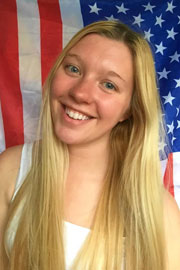
Then she won a New York state writing contest through Health Occupation Students of America (HOSA) as a high school student, earning a trip to Disney World in the process.
By the time she arrived at SUNY Cortland, Barnstead’s goals had shifted. She blended her passion for politics and her skill for writing as a dual political science and professional writing major.
“The combination of political science and writing gave me a holistic approach to what I could do,” Barnstead said. “The intersection of politics and writing is all around us. You can’t really be a political scientist without strong writing skills.”
Barnstead got hands-on experience in the sweet spot between her two major interests, serving as the news editor of the Dragon Chronicle for three semesters. She also worked as the publicity intern for the Institute for Civic Engagement, developing a series of social media posts called “Humans of Engagement,” based on the popular Instagram feed “Humans of New York.” Barnstead’s posts highlighted the applied learning experiences of fellow Institute for Civic Engagement interns and increased audience traffic by more than 1,750 percent.
Committed to service in the Cortland community, Barnstead volunteered 100 hours of her time through Alpha Phi Omega. She also was a resident assistant on campus for two years.
“I knew right away that I wanted to be really involved as a student,” she said. “I was in high school. I also knew that the job market is competitive and that would set me apart from other people. I really just looked for extracurricular activities that further developed what I was already pursuing.”
Barnstead, who graduated in December, currently works in the Washington, D.C. metro area. The ability to tailor her education to her interests, on top of the wide range of extracurricular activities in which she participated, have helped prepare her for life after college.
“I got so much out of SUNY Cortland,” she said. “The biggest thing for me was the ability to progress through my degree in the way that I wanted to. I came in as a freshman and took some 300-level courses. That was really good for me because I was able to go through at my own pace and set my own schedule. SUNY Cortland in general is a great place to go to get your education because I feel like I came out well-rounded and ready to tackle problems.”
Kaley Clavell
Clavell’s teachers always knew what was in store for her.
As a student, she was like a second teacher in the classroom.
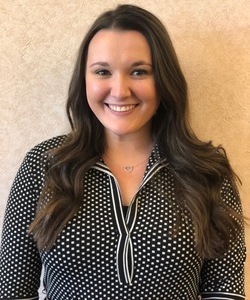
A childhood education and early childhood education dual major, Clavell has already put her skills to the test as one of the College’s Cortland Urban Recruitment of Educators (C.U.R.E) students. She has spent time student teaching in five different schools and has developed a passion for learning how school administrators can better serve their students.
“I joined C.U.R.E. because I didn’t grow up in an urban area,” she said. “I knew how my experience was in school, but I didn’t know much about how other people’s experiences were because I grew up in a pretty affluent district. We had a lot of resources but that wasn’t everyone’s experience.
“I am really interested in how urban education can shape the future of students in urban areas. I knew there was a need for really strong urban educators and I have a passion for working on the injustices in education.”
This spring, Clavell is student teaching at the Bronx Charter School for Better Learning. She had previously taught at schools in Cortland, Ithaca, Marathon and Syracuse. During her junior year, she participated in the ethnography in education research forum through the University of Pennsylvania, researching the inequities and microaggressions that students of color face in schools.
Clavell also has been an active presence on and off the campus. She served on the Student Leadership Cabinet in 2016 and 2017, as president of Students Active for Ending Rape (SAFER) and founded the Education Leadership Committee during the fall semester of her senior year. The Education Leadership Committee brings together education majors from all corners of SUNY Cortland.
“It involves students from all aspects of education, from the early childhood program to special ed and phys ed,” Clavell said. “We talk about our concerns in our programs and work to get our voices heard.”
Clavell has accomplished all of this despite undergoing a major surgery to remove a tumor in her jaw between her freshman and sophomore years. Thanks to the help of musical therapy staff members at Mount Sinai Beth Israel Hospital in New York City, Clavell got through the ordeal in high spirits. She was recognized by the Louis Armstrong Center for Music and Medicine as a patient who embodied the positive effects of music therapy.
Clavell went on to become a champion for the Head and Neck Cancer Foundation’s “Faces of Courage” campaign.
The experience made Clavell a stronger person and a more empathetic educator.
“It really opened my eyes to the challenges that students go through,” she said. “I was a student myself going through a challenging time in my life. I had never related to students in that aspect. If they go through something or if they know somebody who is going through something, that can really affect every aspect of their life. I can relate it to the teaching field and it has made me such an advocate for so many different reasons.”
Eryn Griep
Griep not only comes from a big family — her mother has 12 siblings and her father has 10 — she is a first-generation college student.
Those two factors shaped the path of Griep’s SUNY Cortland experience.
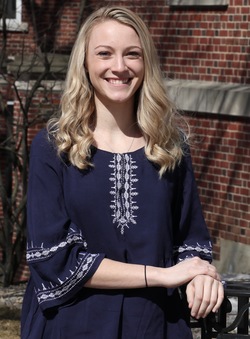
As a freshman, Griep found it hard to adjust to college life. Yet she had support from a number of places, including the College’s Resident Advisors.
So she decided to pay it forward by becoming an RA herself.
“I struggled a lot my first year and it was hard because no one else in my family had really gone through it,” Griep said. “I didn’t know what to expect. My sophomore year I became an RA because I wanted to help people who were going through the same situation. I knew if I could get through it, anyone else could.”
She spent her sophomore and junior years assisting first-year students in Hendrick Hall and is currently an RA for primarily sophomore and transfer students in Smith Tower.
Whether it’s a finicky roommate, offering tips on how to keep up academically, emotional support or everything in between, Griep is a lifeline for students in need. The work is never-ending, but she loves lending a helping hand.
“You’re always on duty, technically,” she said. “But when it’s something that you enjoy that much it doesn’t feel like it’s taking up that much of your time at all.”
She credits Marinda Souva, assistant director for transition programs, and her advisor, Anna Curtis, assistant professor of sociology/anthropology, for helping mentor her both in academics and becoming a better RA.
Griep has been a member of the Criminology Honor Society and was a recipient of the Michael C. Holland Memorial Scholarship, awarded to students who excel either in Student Government or Residence Life and Housing activates. She has worked with the College’s Advisement and Transition Office.
In conjunction with Residence Life and Housing, Griep has worked with residents in the annual Adopt-A-Family event, which raises money to provide gifts for local families during the holiday season.
Griep has been so moved by her experience as an RA that she has decided to pursue a career in higher education.
“Right now, I’m looking toward student conduct. I think it’s such an interesting office because I’m a political science and criminology major. I’ve also seen the positive impact that student conduct has had on a lot of my residents.”
Griep admits that being an RA can sometimes be a thankless job.
“There was one student who made it all worth it,” Griep said. “They struggled a lot but toward the end of the semester they said, ‘I wouldn’t be here without you.’”
Marisa Lobelson
Lobelson saw competitive mountain biking on television when she was a child and became enthralled by the sport. She travelled all across Connecticut, New York and New Jersey during her high school years, participating in races.
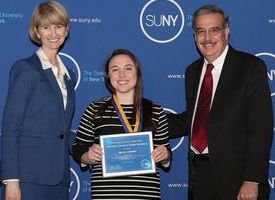
When Lobelson set foot on the SUNY Cortland campus, she didn’t waste any time in pursuing her passion. She founded the College’s mountain biking club during the fall semester of her freshman year.
“It was an opportunity for me to grow in terms of my leadership skills and organization,” she said. “It taught me a lot about deadlines and how to lead as well. It was a club that had a lot of difficulties starting up and throughout my years running it, so that taught me a lot about perseverance.”
A therapeutic recreation major, Lobelson graduated from SUNY Cortland in December. She chose to focus on the therapeutic side of recreation because she learned about the ways it can help those with disabilities or mental illness lead more fulfilling lives.
“I really loved recreation and the idea of getting outside and connecting people to leisure,” she said. “I liked the idea of helping people with disabilities get connected to leisure. The instant I read about therapeutic recreation, I knew this could be it for me.”
Lobelson recently finished an internship at New York Presbyterian/Columbia University Medical Center, where she worked in inpatient adult psychiatry. Her experiences there allowed her to do original research that combined the learning she had done in the classroom at SUNY Cortland with the hands-on work she did at the hospital.
“One of the greatest opportunities that I had was that they let me create my own group protocol,” she said. “I was able to do research and create a group called Leisure Pathway, a leisure counseling group for patients. I was able to present this to the Therapeutic Recreation Department and the clinical team on the unit and it’s a group that is still being used there today at the hospital.”
Lobelson also participated in the ski and snowboard club, the inclusive recreation club and served as a resident assistant. She also was a teaching assistant for a diversity and inclusive recreation services course, developing and teaching content on mental health and Native American diversity issues in recreation.
While mountain biking might not be for everyone, Lobelson is excited to help patients find the recreational activity that is right for them. In addition to other treatments, including psychotherapy or medication, leisure makes a difference in people’s lives every day.
“The main thing about leisure is that it’s what makes a person who they are at their core,” she said. “It’s what makes someone themselves and it gets them back to being themselves. A lot of times with mental illness, people won’t feel like themselves and they can’t control their thoughts. That’s the part of leisure that I really like in treating mental illness. It makes the person feel like who they are. They aren’t their mental illness, they are what they love to do.”